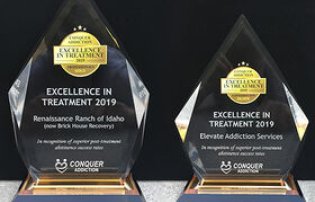If you talk to Ally Abrams, a mom whose son went through over 12 rounds of rehab, and the very large number of moms like her, you’ll find a similar concern - they want a treatment program that works.
Or maybe we can talk to the Gary Mendells and Justin Phillips of the world, two parents that lost their children to addiction after multiple rehab stays and over a hundred thousand dollars invested out of pocket.
The fact is that treatment outcomes matter. More than simply for the purpose of promoting your program, they matter because great treatment has a high potential for saving lives. As a recent series of commercials points out, “Just OK isn’t OK.” You would never send your own family member to a treatment program you thought was “just OK” or “good enough” because we’re not talking about trying out the new burger joint in town, we’re talking about life or death. We’re talking about addiction.
Tracking Treatment Outcomes Matters
In every aspect of life, whether personal, in a business, or in a non-profit, tracking outcomes matter. We can’t improve if we don’t know where we’re starting from or have points of comparison.
In my world, which is the world of organizational growth, tracking is the foundation of everything we do for our clients. If I don’t know what your average cost per call is per marketing channel, I can’t tell you if they’re working or not. If I don’t know what the conversion rate of calls to admissions is for your call reps, or referrals to admissions for your business development reps, I can’t tell you who’s doing the best job and who needs additional training.
Data is the foundation for determining what’s working and what’s not. It also shows us the areas of greatest need, which are often the same areas where changes can have the greatest positive impact.
Tracking business outcomes matter for business growth. But they pale in comparison to the need to track clinical outcomes, where far more than business growth is at stake. If your loved one was entering a program and one clinician helped 3 out of 10 patients find recovery, while the other averaged 1 out of 10, who would you want to send them to? If you’re a therapist yourself, wouldn’t you want to know if your methods were less successful than most others in actually treating patients? The answers here are obvious.
Clinical Outcomes Tracking Builds Trust
Without even promoting or highlighting results from any clinical outcomes tracking, just the fact that a provider does it is already building trust with potential patients and their families. It lets them know you’re serious about maintaining quality, serious about outcomes, and serious about identifying areas for improvement. As someone looking to send a loved one into treatment, or looking for treatment themselves, any program tracking outcomes is already a head above the rest.
And trust is the foundation of all marketing and business success. It’s the only thing that ensures your business will be here not just tomorrow, but ten years from now as well. As I always ask my team, how does what we’re doing right now for our clients help build trust with the communities who need them?
Tracking outcomes builds trust and it provides hard data. It’s not just some guy dressed up in a doctor’s lab coat telling you “treatment works,” it’s real information that I can then compare to other programs and methods of treatment.
And let’s not forget that honesty breeds trust in general. Look at this fantastic article by John Hopkins on pancreatic cancer survival rates. While incredibly low, they are upfront with patients about their chances AND they offer hope and information regarding their treatment throughout the article.
If you believe your team has the expertise to treat such a difficult disease, and you’re upfront with potential patients about probabilities of success, they’re much more likely to go with you as a provider.
Don’t Lie or Spin the Results
Of course, there have been a number of programs over the years that make up results or present data in disingenuous ways. We’ve all seen them, the program that claims they have a 90% success rate or the one that identifies their sole criteria for success as simply “completing a 30-day stay.”
While such shady marketing may trick a family or two, most see it clearly for what it is, bullshit, and they don’t call those programs because of it. Over time, programs engaging in this kind of deceit fail, usually sooner rather than later. Because if your customers and potential customers don’t trust you, you don’t have a business.
Proudly Promoting Your Outcomes
As the team at Vista Research Group will tell you, not everyone is happy with the results they see when they initially start tracking outcomes. And that’s fine. Maybe you don’t want to promote the fact that one of your therapists is 50% less effective than the average.
But this is a start and you can use that data to re-train that therapist or replace them with a better one. Over time, you will have results you are proud of, and that’s when to start including it in your marketing campaigns.
The treatment space is incredibly crowded these days. And, if we look at residential beds nationwide compared to the number of people seeking residential treatment, there are simply too many beds. This means competition has become intense.
Most providers are completely undifferentiated. They all offer “drug and alcohol treatment” with “dual diagnosis,” and “trauma-informed care.” Websites look the same, marketing looks the same. As a consumer, I can’t really tell one provider from another.
But outcomes is one way do stand out, to get noticed, to start building more trust than a competitor who doesn’t track outcomes. As I mentioned above, you’ll get noticed at first simply because you’re discussing outcomes and nobody else is. Then, if you’ve done your job right, when others do start tracking outcomes as well, you’ll have started so much farther ahead of them that you’ll have used that data to improve your program, delivering better outcomes than others.
Data Doesn’t Just Drive Marketing, It Hones an Organization’s Entire Focus
You’ll also find what you’re good at. Maybe you notice that, for whatever reason, your treatment outcomes are much better with men over 30 than any other group. So now, rather than competing with every other program across the nation for any and all patients, you’re just focused on a specific group of people that you serve best.
Even better, your results are superior to anyone else’s. So now you’re spending less money on marketing because you’re marketing to a smaller group of people, and that group of people is more likely to come to you for treatment because you get better results (that you’re promoting across marketing channels of course!)
If you want an organization that provides high-quality care AND achieves growth objectives, tracking and promoting clinical outcomes is one of the smartest things you can do.
Nick Jaworski is the owner of Circle Social Inc, a growth consulting & marketing agency that helps recovery centers and other healthcare organizations connect with patients and their communities to grow their census. He is also an advocate for a more human-centered, individualized and evidence-based approach to addiction treatment due to having gone through his own addiction issues as a youth. When he's not online, he can be found spending time with his favorite person in the whole world, his daughter.




